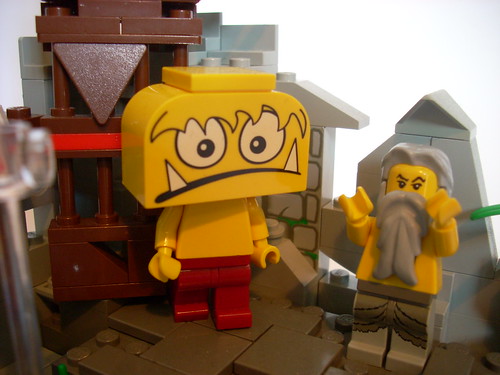Hey guys, so I actually meant to post this on time on Monday, but I guess I didn't actually publish it. I found it today among my drafts after I realized that it hadn't been posted. So without further ado, Mondays post.
So reading through The Tempest, I decided to take our professor's advice and take special note of who is in power and whether or not Prospero has control of the situation. Power is a fairly consistent theme throughout the play thus far, manifesting itself in just about every character.
One particular scene illustrating the balance of power is act II scene I after the party falls asleep, leaving Antonio and Sebastian to converse by themselves. The two agree to kill Alonso and Gonzago, the first so that they may both increase their political power, the second because they dislike him and believe that they have the power to get away with it. However, despite how confident they are in their power, Prospero, through Ariel, is the one really controlling the situation. Ariel causes Gonzalo to awaken, therefore foiling the plot of the two power-hungry jerk-wads.
Ariel herself is an enigma and contradiction of power. Without Ariel, Prospero would essentially be powerless, since everything he does is through his command of Ariel. Ironically, Ariel is arguably the most naturally powerful person in the play, yet is tethered down to Prospero's whim and decree, completely powerless for all of Ariel's magic. And yet, despite Ariel being the source of Prospero's power, he bullies her into submission to do his will. At the first sign of resistance from Ariel, Prospero reminds him/her of the debt owed to Prospero, claiming that he/she is ungrateful and has forgotten the pain and torment of Sycorax's spells. Power corrupts. Absolute power corrupts absolutely. And Prospero is certainly going through a power trip. Which brings us to Prospero's other slave, Caliban.
Despite his strength and physical superiority to Prospero, the misshapen native grudgingly serves Prospero simply because to do so is less painful than outright defiance. Prospero uses his magic to torment Caliban when he doesn't yield to Prospero's commands. Starting to see the corruption yet?
Another major scene that contributes to the overall theme of power is act III scene II where Caliban defects to serve a drunkard that offers him wine. It is fairly obvious that Stephano, the man that Caliban has chosen to serve, is below Prospero in station and power, yet Caliban chooses him over Prospero because he offers reward instead of punishment. This furthers out understanding of the relationship between Prospero and Calban. From my point of view, Caliban gains absolutely nothing from serving Prospero besides relief from punishment.



So, I'm going to step in here and defend Prospero a bit. I don't think he is corrupt, but he is rather trying to help those who he thinks he can corrupt. The scriptures teach us that God punishes and chastises those he loves, because it helps us grow and learn what is good and bad. If we look at Prospero as a god figure (which I think is reasonable in this allegory) then he is simply trying to help change Caliban into a good... person(?), and he is trying to help Ariel appreciate her freedom when she gets it (after all, the things we really appreciate are the things we work for). I think his benevolence is shown at the end of the play when he forgives everyone and frees Ariel. But, that is just how I see Prospero. I think your view is just as valid.
ReplyDelete